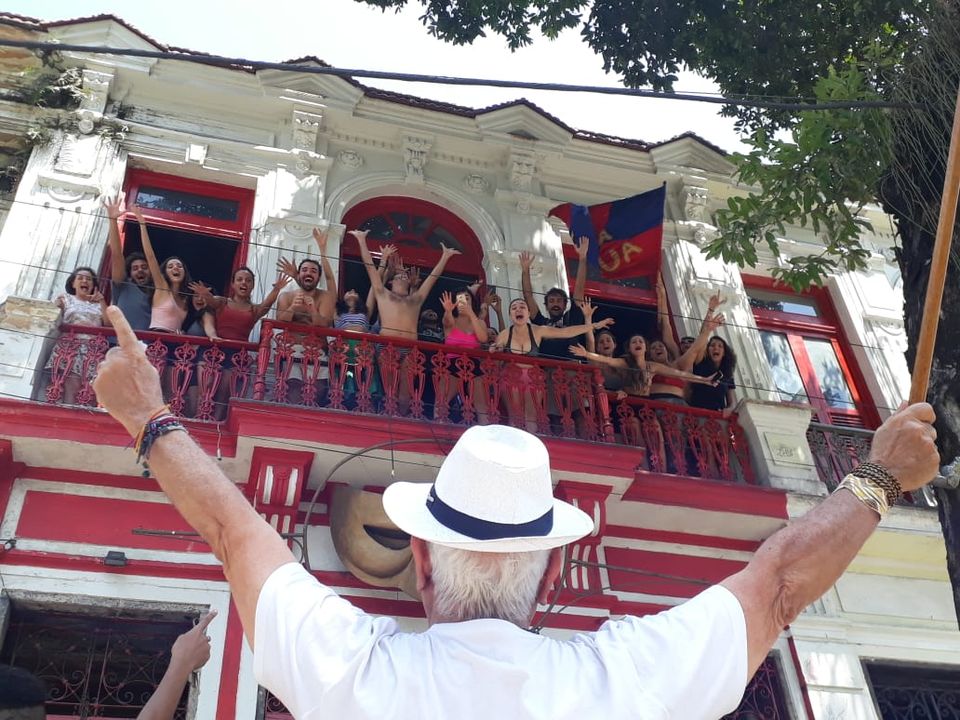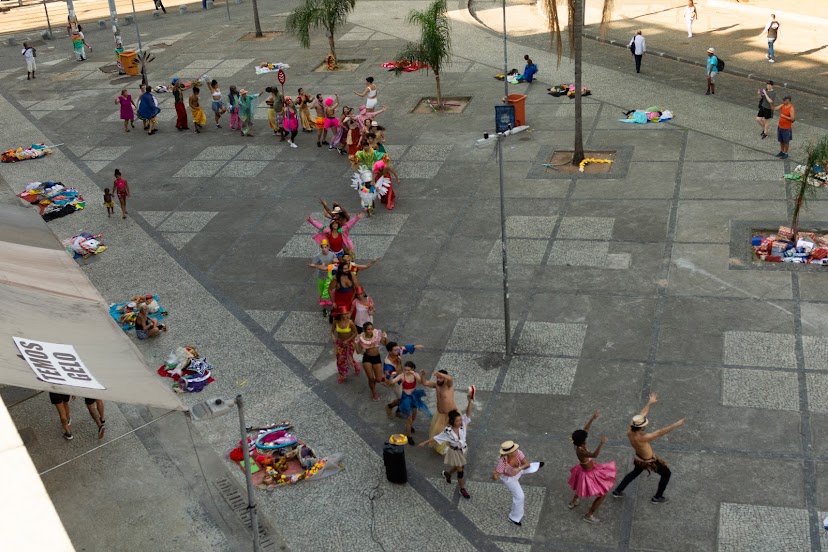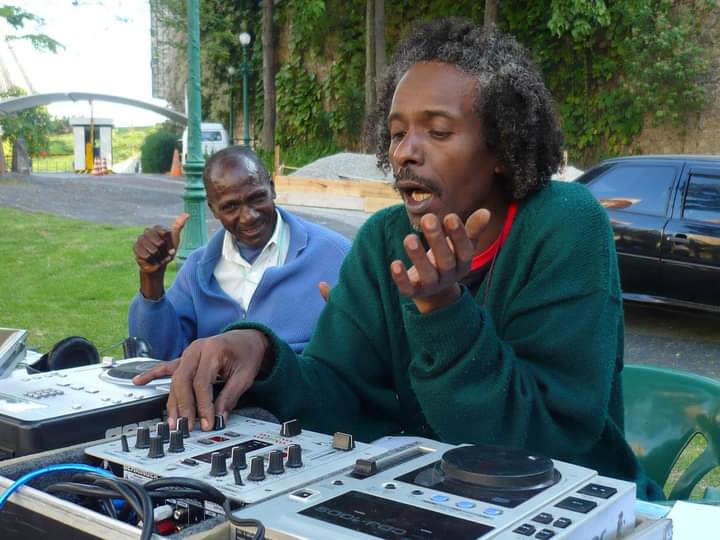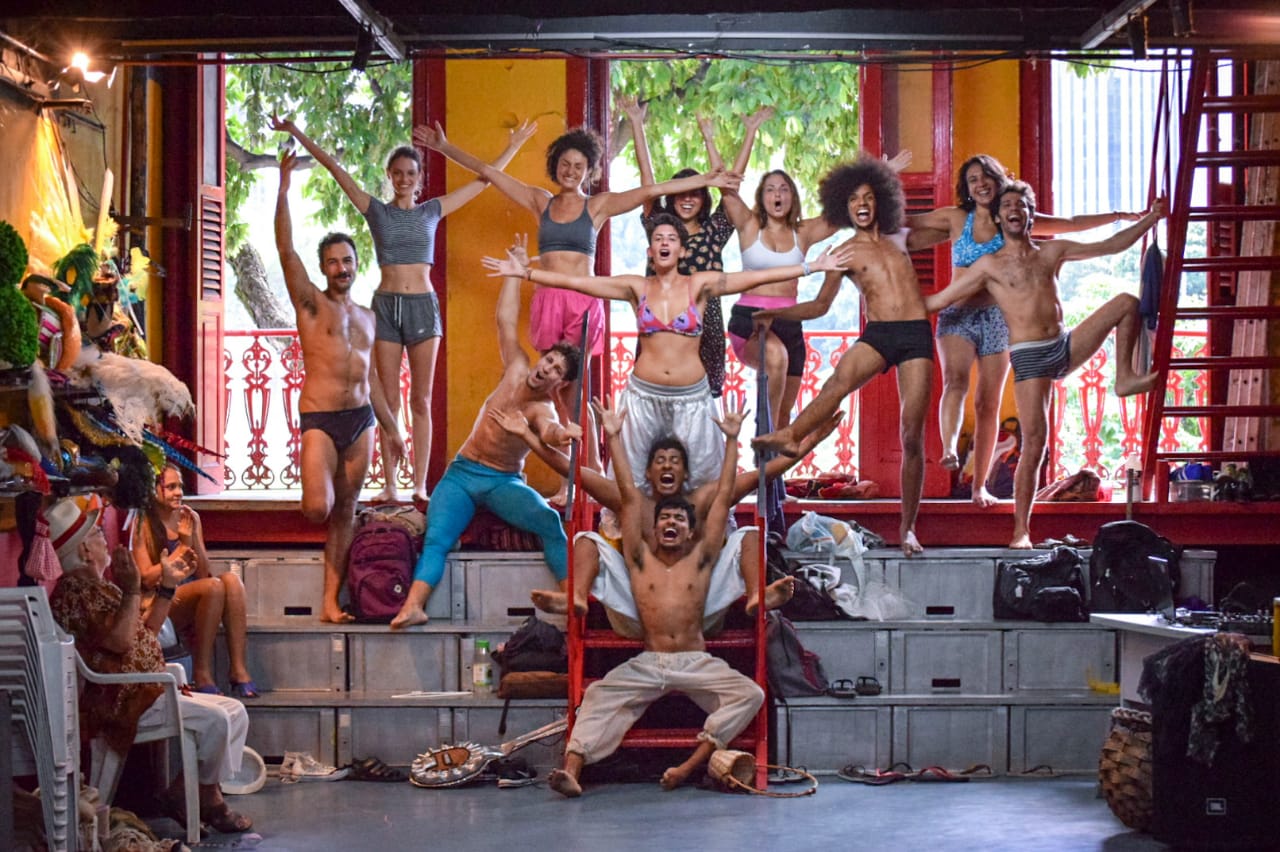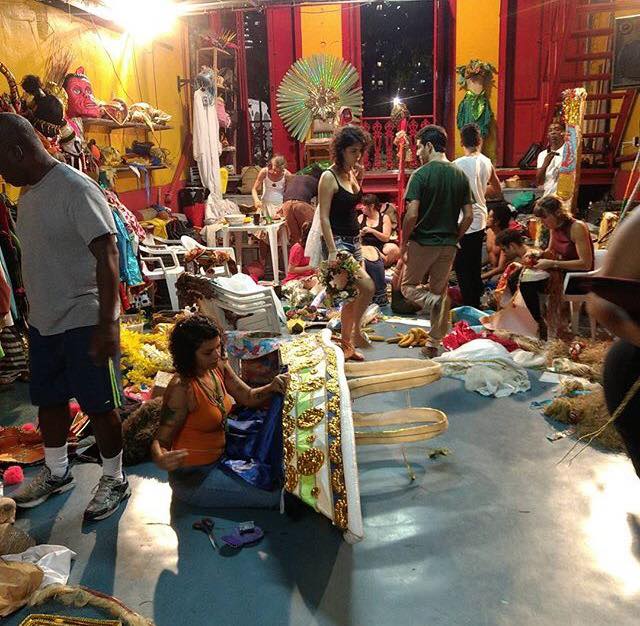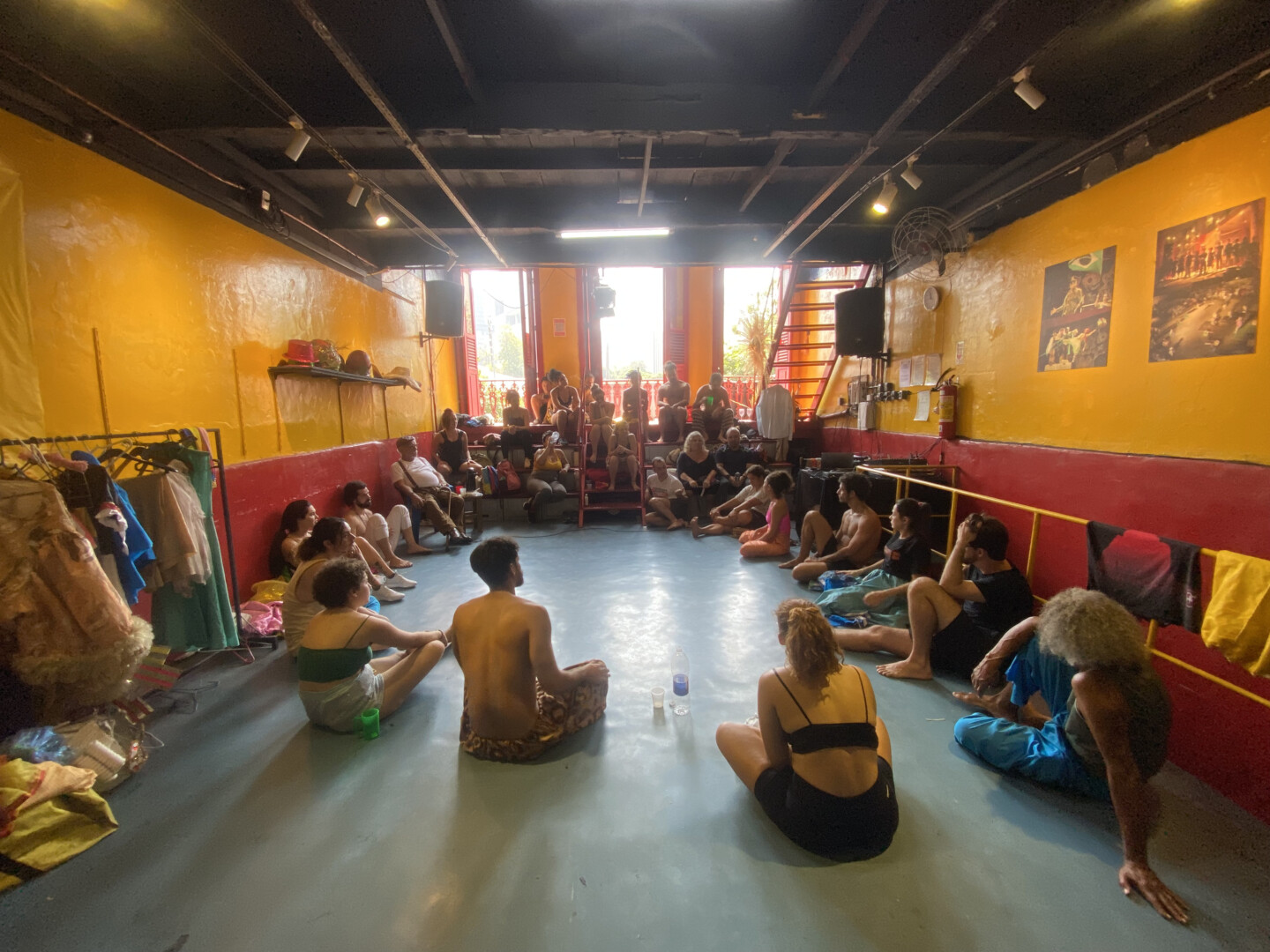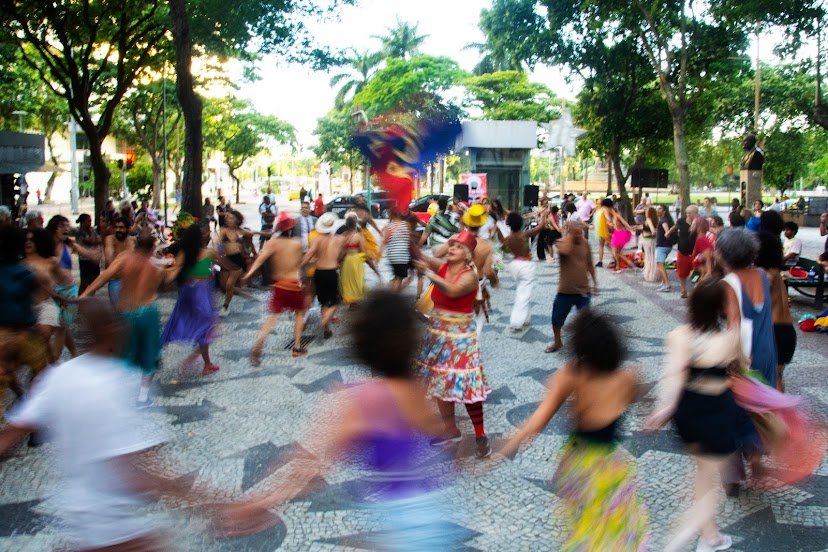The fruit of the tree of knowledge! He’s already gorging himself. Though it may be an eternal curse, he cannot resist and stuffs himself—a miserable glutton! Sometimes I think: I would gladly be buried ten fathoms underground, where no light could reach, just to know what light truly is. And the worst part: what I know, I cannot keep silent. Like a lover, like a drunkard, like a traitor. It’s truly an addiction, and it leads to ruin. (Galileo Galilei, B. Brecht)
Having a school to pass on its knowledge and language has always been a dream and ideal for Tá na Rua. The theater workshops, which began in its early years, are the seed of this project; they were the first space for exchanging and transmitting knowledge. This dialogue has greatly enriched the group’s research and contributed to the development of its theatrical language.
The real possibility of establishing a Tá na Rua school only emerged when the group began to occupy the Casa, whose spacious halls helped bring this dream to life. The continuous offering of workshops in these spaces paved the way for the development of the school by enabling a clearer process for transmitting the group’s developed language. These workshops allow participating actors to refine their artistic, spatial, and textual comprehension skills through engagement with Amir Haddad’s ideas and teachings.
Rooted in a language inspired by Amir’s observations and readings about the dramatic forms of Brazilian popular culture—such as *bumba-meu-boi*, liturgical-religious processions, the structure of samba school rehearsals and parades, and other festivities—this school is named the Carioca School of Brazilian Spectacle.
Carnival is part of my theater school curriculum, which is called the Carioca School of Brazilian Spectacle. I wish there were also a Northeastern School of Brazilian Spectacle and an Amazonian School of Brazilian Spectacle; that it would be possible to work on and gather ideas and dramatic forms specific to each region, which are abundant and diverse throughout Brazil, instead of continuing to draw only from the already exhausted European spectacle. In this way, we could discover a spectacle suited for the future. (Amir Haddad)
Tá na Rua’s workshops are characterized by their informal nature, aiming to bring out what is most essential in the actor: freeing the body, fostering a more genuine connection with emotions and sexuality, enhancing their ability to reflect on reality, form opinions about events, and explore their possibilities and capabilities as human beings.
The workshops aim to refine the actor’s expression, making them freer, with broader gestures, a more agile and expressive body, and an acute awareness of spatial dynamics. Participants become attuned to the idea that they are transmitters of energy, transforming and being transformed wherever they stand at the center of the space around them.
These workshops create harmony between the internal and external aspects of the actor, working on their emotional depth and the outward expression of these emotions through actions and movements. They empower the actor to use their body to express their understanding of the world.
I train actors to position themselves in the space, like a player on a soccer field, because they have a perfect sense of how to place themselves and what relationships are established in the scene. (Amir Haddad)
Read More
The spaces for transmitting knowledge have always been present in the trajectory of Grupo Tá na Rua. One of the first events the group participated in was a series of workshops held at Teatro Garagem, in Brasília-DF, in 1980, where the group developed work that involved intense audience participation. This included expressive body movements inspired by music of various rhythms, text readings, and the creation of improvised scenes – the Theatrical Workshops.
In 1981, during a period when the group occupied a space at the Casa do Estudante Universitário – C.E.U., in Botafogo/RJ, and simultaneously received some financial support from Fundação Rio/RioArte, this type of work became continuous. In a short time, a group of about thirty people began attending these activities weekly. The strength of this movement led the group to consider, from that point forward, the possibility of creating a school where this work could be carried out more broadly.
The first step toward realizing this idea occurred in 2001, with the creation of the Center for Actor Training and Development, established to consolidate the workshop nucleus of Casa do Tá na Rua and to implement U.T.I. – Intensive Theatricalization Unit / Affective Gym, offering workshops conducted by actors from the group and other professionals.
In the same year, through a partnership between the Center for Actor Training and Development and Teatro Carlos Gomes – aimed at expanding the effective actions of theater administration as a public cultural space established in downtown Rio de Janeiro – the Carlos Gomes in Training project was created. This project provided theatrical workshops for actors and non-actors. Beginning in August 2001, the project integrated the work of two theatrical groups located in the same neighborhood/space of the city: Grupo Tá na Rua and A Casa (the latter comprised the groups: Teatro de Anônimo, Diadokai, Abayomi, Cia do Público, Cordão do Boitatá, Boi Cascudo, and Juliana Jardim). A total of 18 workshops were conducted, and activities culminated in the presentation of a Christmas Play, based on a poem by Patativa do Assaré, in Praça Tiradentes-Centro (RJ), in December 2001.
In the following years, the continuous realization of various workshops solidified this work and enabled the creation of the School.
Broadly speaking, Tá na Rua’s workshops share a common characteristic: strengthening both the individual and the collective. In deep alignment with the thoughts of its coordinator and guide, the group perceives theater as a collective art, and thus its training should also be collective. These workshops, whether short, medium, or long-term, serve as spaces for knowledge transmission and training for the group’s actors.
Defined as spaces for exchange, learning, and discussions, the workshops sometimes take on specific characteristics that distinguish them. They are structured as follows:
Depressurization Workshop: This is Tá na Rua’s foundational workshop. In its most structured form, typically conducted by the group, it evolves through free improvisations that focus on individual and collective expression. Sound stimuli, via recorded music and/or the use of instruments, alongside scenic materials such as costumes, fabrics, masks, and wigs, form its foundation. By enhancing the actor’s spatial awareness, the workshops foster a deeper understanding of space. Currently, these workshops are also identified by Amir Haddad as Theatrical De-Initiation Workshops.
There are also workshops conducted with specific purposes or thematic focuses, named accordingly. Examples include Christmas Workshops – where traditional Christmas Plays are developed and later performed in streets and squares – and Carnival Workshops, offering experiences in leading theatrical parades using the group’s carnivalized language.
Theatrical Deconstruction Workshops: These are based on the reading of a specific text and focus primarily on the actor’s ability to understand the dramaturgical text. It involves careful work on the author’s thoughts and refining the words to reveal their meaning more clearly, allowing actors to deepen their understanding and develop critical views. Amir Haddad notes that in this process, beyond the deconstruction of the text, which doesn’t necessarily aim to become a performance, it is also possible to deconstruct the actor, the true subject of development and work, extracting the essence of both.
Studio A: Similar to the Deconstruction Workshops, this one employs fragments of scenes or classical texts to help actors critically examine dramaturgy beyond the written word.
